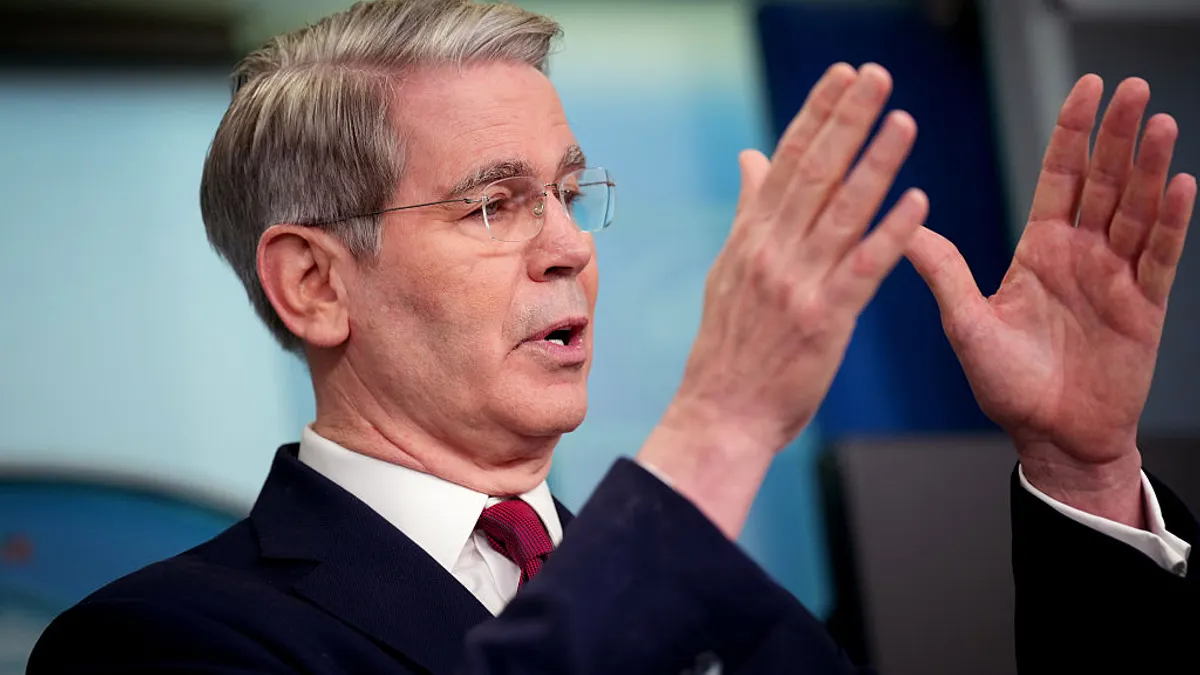CFOs have had a taxing year. Managing their companies' response to the pandemic, working to keep a healthy balance sheet, and acting as the CEO's right hand has no doubt left finance leaders exhausted, and even overworked. Next year isn't likely to be much easier.
Aneel Delawalla, managing director of global enterprise value targeting at Accenture, works with CFOs every day, and told CFO Dive what should be top-of-mind for financial executives as they navigate another year of hard work, and many more years at the helm.
A new level of performance
Once consumer demand rebounds, it is incumbent upon CFOs to impress the importance of ESG reporting. In picking which causes to align with, CFOs must ensure these map back to the company's strategic priorities. This lets organizations ensure there's room to invest in other areas, such as supply chain and green finance.
"Obviously, there are regulatory-mandated reporting requirements, but more importantly, we're seeing a shift in demand what customers expect from the companies," Delawalla said. "It's not just about reporting requirements, or checking a box, but mapping those into the mission and strategic priorities."
The rise of green finance
As companies work to develop and build on the "why" behind their purpose, CFOs — as the CEO's partner — will have to translate this purpose into investment priorities, financial outlooks, how this manifests throughout day-to-day business operations and how they're perceived by stakeholders.
"Green finance," defined by the United Nations as a way of "increasing the level of financial flows from banking, micro-credit, insurance and investment from the public, private and not-for-profit sectors to sustainable development priorities," should be a priority.
Green finance, like ESG, is tied to mission, vision and purpose, Delawalla said. But it's broader, and is not only an investment in monetary ROI, or balance sheet impacts; it's about ensuring continued growth for years to come.
"Some of green finance will be driven by ESG reporting requirements, such as asking how much of revenue is allocated towards driving a net zero carbon emission outcome," Delawalla said.
Because the CFO has a 360-degree view of data, including external reporting, and shapes the company's narrative with the CEO, managing green finance will likely fall on their plate.
Continued CFO-Chief Supply Chain Officer collaboration
Following this year's widespread supply and value chain disruptions, CFOs and Chief Supply Chain Officers will have to work closely to ensure they leverage real-time data, IoT, and cloud computing to identify weak spots and avoid any continued issues.
Going further, the CFO and CEO's partnership with every C-suite leader is vital for full enterprise success, Delawalla said.
"When it comes to CSCO and CFO, there are so many macro trends," he added, naming pandemic disruption, nationalist policies, tariffs and escalating China-U.S. tensions as examples.
"You also have waves of tech transformation coming; you need a view of what's happening at the edge of enterprise," he said. "All of that forces the collaboration between chief supply chain officer and the CFO."
The two need to come together, because their job will not only be to improve forecasting for external stakeholders, but to know when the company will meet demand, and how the company will achieve a new level of performance post-investment.
Continued integration of the CFO role
This year, CFOs have been more embedded than ever in their organizations, Delawalla said, and will continue to work hand-in-hand with CHROs, CEOs, CMOs and CIOs in 2021.
"The CFO has sensors at the edges of enterprise. They can see what's happening in Asia or Europe that could hit the U.S. next. They can see what's happening in SMB business that could hit its enterprise business next," Delawalla said. "The CFO sits in that insights, data and analytics place that cuts across functions."
Because of that vantage point, and having that data, they've been asked to connect the dots during COVID-19, and will likely be asked the same afterwards.
"They're first among equals' they have a routine dialogue with the board, are speaking to the audit committee and play that equal role with the CEO," he said. "While the CEO is focused on what the future of the company will look like, the CFO has to architect and make sense of the day-to-day."
Facing uncertainty head-on
The pandemic has created "a constant flurry of uncertainty," particularly regarding issues like geopolitical dynamics. It will likely become the new normal for CFOs to remain closely on the pulse of international markets, as well as how new regulations from countries and specific regulatory bodies may impact investment decisions.
"There's so much CFOs can't control, but they're not going to get a pass from Wall Street or shareholders to forgo guidance," Delawalla said. "CFOs will have to figure out how to have a better pulse on the business, and provide greater predictability. That'll come down to better data, forecasting capabilities, and ways of communicating to the company."
Underpinning those will be a greater move to the cloud, getting data in one place, and leveraging algorithms and AI, he added.
Bottom line
"Speed matters," Delawalla said. "Speed will differentiate, and be a competitive advantage as CFOs move forward and invest in 2022 and 2023. CFOs will have to challenge their own function, the finance and accounting function, to have real-time processes that can scale."
Having those real-time processes, both transactional and advisory, will unlock the speed for the function, but, more importantly for the enterprise, will allow for better decision-making ahead of competition.
Dealing with volatility, and taking advantage of investments in cloud and data, must culminate in asking, "is this making you faster? Will you have more speed where it matters with the market or consumer?" These, Delawalla said, are the core questions as the new year begins.





















